Recommended Reading
Moving Mountains: How One Woman and Her Community Won Justice from Big Coal
by Penny Loeb
The Clash over Coal in the Mountain State
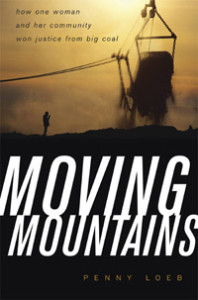 Lexington, KY—A hotbed of contemporary criticism and conflict, mountaintop removal is both praised by coal companies as the most effective mining technique and lambasted by environmentalists for the irreversible destruction it wreaks upon the land. The process involves the use of explosives and heavy machinery to slice off several hundred feet from the tops of mountains in order to expose the rich seams of coal that lie beneath. Just as significant as the harm done to the land, however, is the effect on the surrounding communities when the promise of profits leads big coal companies to increasingly disregard the neighborhoods affected by their mining techniques.
Lexington, KY—A hotbed of contemporary criticism and conflict, mountaintop removal is both praised by coal companies as the most effective mining technique and lambasted by environmentalists for the irreversible destruction it wreaks upon the land. The process involves the use of explosives and heavy machinery to slice off several hundred feet from the tops of mountains in order to expose the rich seams of coal that lie beneath. Just as significant as the harm done to the land, however, is the effect on the surrounding communities when the promise of profits leads big coal companies to increasingly disregard the neighborhoods affected by their mining techniques.
Author Penny Loeb first became interested in the mountaintop removal conflict in 1997, when she authored an award-winning article on the matter for U.S. News and World Report. In Moving Mountains: How One Woman and Her Community Won Justice from Big Coal, she recounts the story of Patricia Bragg, a Pie, West Virginia, native whose community was upended when coal companies chiseled into the nearby mountains in 1994. After longwall machines used in deep mining sapped her neighbors’ wells, Bragg rallied her community to demand rights for the neighborhoods devastated by the mining. With Bragg at the helm, eighty-eight homeowners sued the U.S. Army Corps of Engineers for their failure to comply with the Surface Mining Control and Reclamation Act. Lead by lawyer Joe Lovett, their dispute culminated in Bragg v. Robertson, a historic case that temporarily halted mountaintop dumping in the nearby valleys and forced the implementation of proper resurfacing techniques.
Though Loeb heralds the victory of the Pie community, Moving Mountains is not strictly an antimountaintop removal treatise. Loeb approaches the controversial issue from all angles, including perspectives from the miners, citizens, politicians, and coal companies involved. She offers detailed profiles of how Bragg v. Robertson affected individuals such as Lovett, miner Bob Schultz, African- American legislator Arley Johnson, and housewife Vicky Moore. Loeb notes that the efforts of Bragg are part of a wider movement taking place over the past fifty years as activism in Appalachia has broadened from isolated debates over individual issues into widespread community action and empowerment. Education and legislation on mountaintop removal and other harmful mining practices are beginning to bring miners and citizens together in order to determine the best solutions for all involved. Moving Mountains documents a bold step taken towards seeking a common solution that will benefit both the environment and regional economies sustained through coal mining.
Penny Loeb, a freelance writer who lives outside of Washington D.C., is a former senior editor at U.S. News and World Report and a former investigative reporter for Newsday. She has received numerous awards for journalism and was a finalist for the Pulitzer Prize in 1988.
July 27, 2008
Book on mountaintop removal wins award
CHARLESTON, W.Va. — ForeWord Magazine, which promotes books released by university and independent publishers, gave a Bronze Award in its 2007 environmental category to Penny Loeb’s “Moving Mountains” about mountaintop removal coal mining in West Virginia
.
“Moving Mountains” focused on Patricia Bragg, a Boone County woman from the town of Pie, who fought against the huge mountaintop removal mines in her area.
Bragg soon became involved in a broad lawsuit against the U.S. Army Corps of Engineers, called Bragg v. Robertson, which temporarily halted mountaintop removal after a ruling by the late U.S. District Judge Charles Haden II.
Loeb, who lives with her husband in Loudoun County, Va., was previously a senior editor at “U.S. News & World Report” and investigative reporter for “Newsday.”
The University Press of Kentucky in Louisville published “Moving Mountains.”
Big Coal: The Dirty Secret Behind America’s Energy Future
By Jeff Goodell
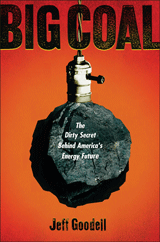 Long dismissed as a relic of a bygone era, coal is back — with a vengence. Coal is one of the nation’s biggest and most influential industries — Big Coal provides more than half the electricity consumed by Americans today — and its dominance is growing, driven by rising oil prices and calls for energy independence. Is coal the solution to America’s energy problems?
Long dismissed as a relic of a bygone era, coal is back — with a vengence. Coal is one of the nation’s biggest and most influential industries — Big Coal provides more than half the electricity consumed by Americans today — and its dominance is growing, driven by rising oil prices and calls for energy independence. Is coal the solution to America’s energy problems?
On close examination, the glowing promise of coal quickly turns to ash. Coal mining remains a deadly and environmentally destructive industry. Nearly forty percent of the carbon dioxide released into the atmosphere each year comes from coal-fired power plants. In the last two decades, air pollution from coal plants has killed more than half a million Americans. In this eye-opening call to action, Goodell explains the costs and consequences of America’s addiction to coal and discusses how we can kick the habit.
Lost Mountain: A Year in the Vanishing Wilderness
By Erik Reece
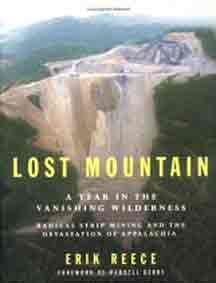 A new form of strip mining has caused a state of emergency for the Appalachian wilderness and the communities that depend on it-a crisis compounded by issues of government neglect, corporate hubris, and class conflict. In this powerful call to arms, Erik Reece chronicles the year he spent witnessing the systematic decimation of a single mountain and offers a landmark defense of a national treasure threatened with extinction.
A new form of strip mining has caused a state of emergency for the Appalachian wilderness and the communities that depend on it-a crisis compounded by issues of government neglect, corporate hubris, and class conflict. In this powerful call to arms, Erik Reece chronicles the year he spent witnessing the systematic decimation of a single mountain and offers a landmark defense of a national treasure threatened with extinction.
Read an interview with Erik Reece here.
Bringing Down the Mountains:
The Impact of Mountaintop Removal on Southern West Virginia Communities
By Shirley Stewart Burns
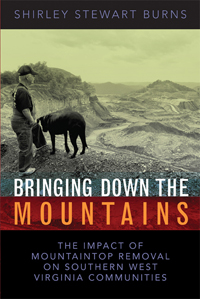 “Bringing Down the Mountains not only tells the story of coalfield residents’ fight against mountaintop removal, but it puts this tale into the important historical context of the continuing fight between West Virginians and outside coal interests over the use—and sometimes abuse—of the state’s natural resources. Shirley Stewart Burns reminds readers that West Virginia’s history is a long series of fights over who benefits and who is damaged by coal extraction, how the riches created by the coal-based economy are divided, and who decides the outcome these vital issues.” — Ken Ward Jr., The Charleston Gazette
“Bringing Down the Mountains not only tells the story of coalfield residents’ fight against mountaintop removal, but it puts this tale into the important historical context of the continuing fight between West Virginians and outside coal interests over the use—and sometimes abuse—of the state’s natural resources. Shirley Stewart Burns reminds readers that West Virginia’s history is a long series of fights over who benefits and who is damaged by coal extraction, how the riches created by the coal-based economy are divided, and who decides the outcome these vital issues.” — Ken Ward Jr., The Charleston Gazette
Miners, Millhands, and Mountaineers: Industrialization of the Appalachian South, 1880-1930
By Ronald D. Eller
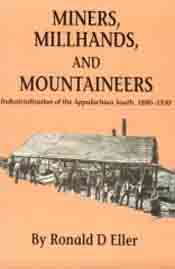 “As a benchmark book should, this one will stimulatethe imagination and industry of future researchers as well as wrapping up the results of the last two decades of research. . . . Eller’s greatest achievement results from his successful fusion of scholarly virtues with literary ones. The book is comprehensive, but not overlong. It is readable but not superficial. The reader who reads only one book in a lifetime on Appalachia cannot do better than to choose this one. . . . No one will be able to ignore it except those who refuse to confront the uncomfortable truths about American society and culture that Appalachia’s history conveys.”
“As a benchmark book should, this one will stimulatethe imagination and industry of future researchers as well as wrapping up the results of the last two decades of research. . . . Eller’s greatest achievement results from his successful fusion of scholarly virtues with literary ones. The book is comprehensive, but not overlong. It is readable but not superficial. The reader who reads only one book in a lifetime on Appalachia cannot do better than to choose this one. . . . No one will be able to ignore it except those who refuse to confront the uncomfortable truths about American society and culture that Appalachia’s history conveys.”
— John A. Williams, Appalachian Journal.
Transforming the Appalachian Countryside
Railroads, Deforestation, and Social Change in West Virginia, 1880-1920
By Ronald L. Lewis
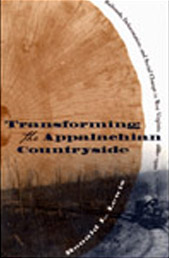 “An important contribution to the growing body of scholarly writing that has been revising the idea of Appalachian exceptionalism for the past decade. . . . Will help banish forever the persistent social construct of a people and region somehow set apart from the major developmental currents of late-nineteenth- and early-twentieth-century industrial capitalism. . . . Meticulously researched, well written, and enhanced by dozens of poignant photographs. It is a welcome addition to the growing body of literature on the dynamism of a rural-industrial society historically dismissed as static.” — Journal of Southern History
“An important contribution to the growing body of scholarly writing that has been revising the idea of Appalachian exceptionalism for the past decade. . . . Will help banish forever the persistent social construct of a people and region somehow set apart from the major developmental currents of late-nineteenth- and early-twentieth-century industrial capitalism. . . . Meticulously researched, well written, and enhanced by dozens of poignant photographs. It is a welcome addition to the growing body of literature on the dynamism of a rural-industrial society historically dismissed as static.” — Journal of Southern History
Coal River
By Michael Shnayerson
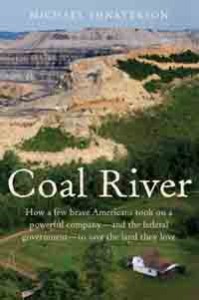 One of America’s most dramatic environmental battles is unfolding in southern West Virginia. Coal companies are blasting the mountains, decapitating them for coal. The forested ridge tops and valley streams of Appalachia — one of the country’s natural treasures — are being destroyed, along with towns and communities. An entire culture is disappearing, and to this day, most Americans have no idea it’s happening.
One of America’s most dramatic environmental battles is unfolding in southern West Virginia. Coal companies are blasting the mountains, decapitating them for coal. The forested ridge tops and valley streams of Appalachia — one of the country’s natural treasures — are being destroyed, along with towns and communities. An entire culture is disappearing, and to this day, most Americans have no idea it’s happening.
Michael Shnayerson first traveled to the coal fields four years ago, on assignment for Vanity Fair. There he met an inspiring young lawyer named Joe Lovett, who was fighting mountaintop removal in court with a series of brilliant and daring lawsuits. He also met Judy Bonds, whose grassroots group, the Coal River Mountain Watch, was speaking out in a region where talking truth to power was both brave and dangerous. The two had joined forces to take on Massey Energy, the largest and most aggressive of the coal companies, and its swaggering, notorious chairman, Don Blankenship.
Strange as This Weather Has Been
by Ann Pancake
 Set in present day West Virginia, Ann Pancake’s debut novel, Strange As This Weather Has Been, tells the story of a coal mining family—a couple and their four children—living through the latest mining boom and dealing with the mountaintop removal and strip mining that is ruining what is left of their mountain life. As the mine turns the mountains to slag and wastewater, workers struggle with layoffs and children find adventure in the blasted moonscape craters.
Set in present day West Virginia, Ann Pancake’s debut novel, Strange As This Weather Has Been, tells the story of a coal mining family—a couple and their four children—living through the latest mining boom and dealing with the mountaintop removal and strip mining that is ruining what is left of their mountain life. As the mine turns the mountains to slag and wastewater, workers struggle with layoffs and children find adventure in the blasted moonscape craters.
